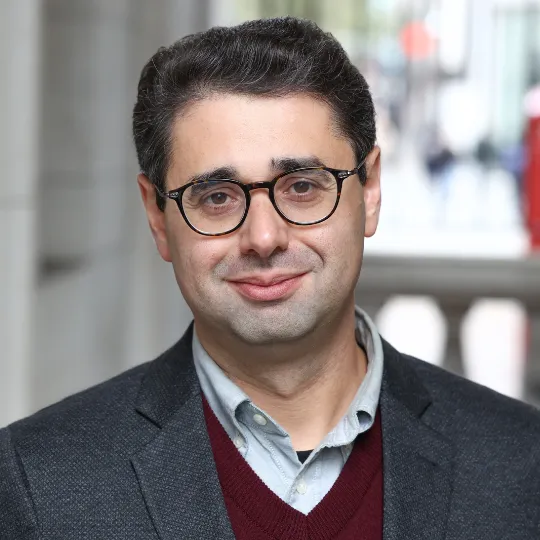
Dr Gregory Asmolov
Lecturer in Global Digital Politics
Biography
Dr Gregory Asmolov is a scholar in the fields of digital entrepreneurship, marketing and crisis communication. He is particularly interested in how digital entrepreneurship can contribute to social resilience and address various types of crisis, and in critical analysis of the digitally mediated participation of digital crowds. He dedicates special attention to cross-cultural aspects of digital entrepreneurship and to the transition of projects from one cultural system to another, as well to the production of value in social entrepreneurship. In this sense, his research addresses digital entrepreneurship as a way not only of generating revenue, but also of contributing to social change and disrupting existing structures of power relations. His research is also interested in the role of digital marketing in agenda-setting in the context of the current attention economy.
Part of his previous research has been dedicated to a conceptual rethinking of crowdsourcing as a participatory practice for the digitally-mediated mobilization of a crowd’s resources. His publications have explored the role of crowdsourcing not only in new forms of participation, but also in new forms of platform-based governance. In order to conceptualize new forms of digital governance, he developed the notion of “vertical crowdsourcing”. Empirically, his research has been mostly concerned with new forms of participation in the context of crisis situations, including the role of digital platforms in protests, armed conflicts and emergency situations. His most recent research has explored the role of digital innovation in addressing COVID-19 while focusing on the tension between different models of crisis-related participation and on how Internet regulation may limit socio-economic resilience in a situation of crisis.
Previously he was a Leverhulme Early Career Fellow at King’s Russia Institute, where he worked on a research project on Participatory Warfare: The Role of ICTs in Modern Conflicts, exploring how digital platforms contribute to their users’ participation in warfare and how social networks foster the convergence of everyday life and conflicts. Gregory has also served as a visiting lecturer in the Media and Communication Department at the Higher School of Economics (Russia) and at the Interdisciplinary Center in Herzliya (Israel), conducted research as a visiting fellow at the Annenberg School for Communication, University of Pennsylvania, and worked as a research assistant at the Berkman Center for Internet and Society, Harvard University.
He holds a PhD from the Media and Communications Department at the London School of Economics and Political Science (LSE) (2016), where he examined how digital platforms constitute the role of users in natural disaster situations. Gregory has a BA in Communication and International Affairs from the Hebrew University of Jerusalem (2007), and an MA in Global Communication from George Washington University (2010).
Research
- Crisis-related digital innovation and digital entrepreneurship
- Digital crowds and socio-political aspects of crowdsourcing
- Digital labour and the future of work
- Peer-to-peer networks and mutual aid
- The impact of Internet regulation on social resilience
- Digital disconnection
- Participatory warfare & the domestication of warfare
- Digital sovereignty
- Propaganda, disinformation and digital authoritarianism
Teaching
Gregory teaches at both undergraduate and postgraduate levels on many areas of digital politics, economics and society: digital entrepreneurship, digital journalism, crisis communications and digital innovation, crowdsourcing, social media and protests, propaganda and the role of digital platforms in authoritarian environments, digital governance and activism, digital labour and the future of work, and the role of digital networks in the emergence of alternative socio-political spaces.
His modules seek to facilitate critical thinking, relying on engagement both with research literature and with practical experience addressing real-life challenges, for instance, via the development of entrepreneurial projects. Some of his teaching also relies on his practical experience as a journalist and news editor, as well as a co-founder of digital projects related to crowdsourcing and digital mapping.
Expertise and public engagement
Gregory has a professional background in journalism and digital social entrepreneurship. Previously to his academic career, Gregory worked as a Middle East correspondent for the Russian newspapers Kommersant and Novaya Gazeta, and served as a news editor and security analyst for Israeli TV. Later, he consulted on media development and social media projects for The World Bank and Internews Network. He also served as a contributing editor of RuNet Echo, a project of Global Voices Online analysing the Russian Internet. In 2010 he co-founded a “Help Map” – a crowdsourcing platform used to coordinate assistance to victims of wildfires in Russia. The project received a number of national and international prizes including the Russian National Internet Award.
Gregory has made guest appearances on a number of TV and radio shows, from the BBC World Service The Real Story, to Al Jazeera's English The Listening Post. He is a regular contributor to openDemocracy. His research has been featured in a number of publications including the New Scientist, the Economist, Wired UK, AP, the Independent and other media outlets. He is a frequent invited speaker at public events organized by international organizations and think tanks including Chatham House, The International Committee of the Red Cross, BBC Monitoring, as well as a regular speaker at the Annenberg-Oxford Media Policy Summer Institute.
Gregory is a consultant for technology companies, advising on digital sourcing and social entrepreneurship. For example, he has been advising a start-up that is developing a new skill-sourcing technology to address the challenge of unemployment and new solutions for the future of work. He has also been research lead on an international project focused on horizon-scanning of the role of digital media in the development of civil society in Central and Eastern Europe.
Gregory is a member of ICA (the International Communication Association), ECREA (the European Communication and Research Education Association), IAMCR (the International Association of Communication Research) and AOIR (the Association of Internet Research). He is also a member of the Strategeast Global Minds Initiative Advisory Board.
Selected Publications
For a full list of publications, please see full research profile.
COVID-19-related publications
- Asmolov, G. (2020). Digital innovation and social resilience: How can Covid-19 help us prepare for the next crisis? King’s College London website, 5 May. https://www.kcl.ac.uk/digital-innovation-and-social-resilience-how-can-covid-19-help-us-prepare-for-the-next-crisis
- Asmolov, G. (2020). Inside the struggle to control Russia's digital volunteering sector. openDemocracy, 8 May. https://www.opendemocracy.net/en/odr/russia-digital-war-for-volunteers/
- Asmolov, G. (2020). ‘Coronovations’: The role of digital platforms in responding to the pandemic. Strategeast, 1 April. https://www.strategeast.org/coronovations-the-role-of-digital-platforms-in-responding-to-the-pandemic/
- Asmolov, G. (2020). ‘Sovereign Virus’: Fake news as the Kremlin’s crisis management tool. Institute of Modern Russia, 16 July. https://imrussia.org/en/analysis/3139-%E2%80%9Csovereign-virus%E2%80%9D-fake-news-as-a-crisis-management-tool
Selected peer-reviewed articles and book chapters
- Asmolov, G. (2022). Internet regulation and crisis-related resilience: from Covid-19 to existential risks, The Communication Review, 25:3-4, 235-257, DOI: 10.1080/10714421.2022.2129124
- Asmolov, G. (2022). The transformation of participatory warfare: The role of narratives in connective mobilization in the Russia–Ukraine war. Digital War Journal. https://doi.org/10.1057/s42984-022-00054-5
- Asmolov, G. (2021). From sofa to frontline: The digital mediation and domestication of warfare. Media, War & Conflict, 14(3), 342-365. https://doi.org/10.1177/1750635221989568
- Asmolov, G. (2020). The failures of participatory mapping: A mediational perspective. In D. Specht (Ed.), Mapping crisis. Participation, datafication and humanitarianism in the age of digital mapping (pp. 39-65). London: University of London Press. www.sas.ac.uk/publications/mapping-crisis
- Asmolov, G. (2020). Runet in crisis situations. In S. G. Davydov (Ed.), Internet in Russia. Societies and political orders in transition. ?: Springer (pp. 231-250). https://link.springer.com/chapter/10.1007/978-3-030-33016-3_12
- Asmolov, G. (2019). The effects of participatory propaganda: From socialization to internalization of conflicts. MIT Journal of Design and Science, 6: 1-24. https://doi.org/10.21428/7808da6b.833c9940
- Asmolov, G. (2018). The disconnective power of disinformation campaigns. Journal of International Affairs, 71(1.5): 69-76. https://jia.sipa.columbia.edu/disconnective-power-disinformation-campaigns
- Asmolov, G. (2017). Vertical crowdsourcing. In A. Ledeneva, A. Bailey, S. Barron & E. Teague (Eds.), The global encyclopedia of informality: Towards an understanding of social & cultural complexity. Volume 2. London: UCL Press (pp. 463-467). https://www.in-formality.com/wiki/index.php?title=Vertical_Crowdsourcing_(Russia)
- Asmolov, G. & Kolozaridi, P. (2017). The imaginaries of RuNet: The change of the elites and the construction of online space. Russian Politics, 2: 54-79. http://booksandjournals.brillonline.com/content/journals/10.1163/2451-8921-00201004
- Asmolov, G. (2015). Vertical crowdsourcing in Russia: Balancing governance of crowds and state–citizen partnership in emergency situations. Policy & Internet, 7(3): 292-318. DOI: 10.1002/poi3.96 http://eprints.lse.ac.uk/67811/
- Asmolov, G. (2015). Crowdsourcing and the folksonomy of emergency response: The construction of a mediated subject. Interactions: Studies in Communication & Culture, 6(2):155–178. DOI: 10.1386/iscc.6.2.155_1 http://eprints.lse.ac.uk/67860/
- Livingston S. & Asmolov, G. (2010). Networks and the future of foreign affairs reporting. Journalism Studies, 11(5): 745-760. http://www.tandfonline.com/doi/abs/10.1080/1461670X.2010.503024
- Asmolov, G. (2013). Natural disasters and alternative modes of governance: The role of social networks and crowdsourcing platforms in Russia. In S. Livingston & G. Walter-Drop (Eds.), Bits and atoms. Information and communication technology in areas of limited statehood. Oxford: Oxford University Press. http://www.oxfordscholarship.com/view/10.1093/acprof:oso/9780199941599.001.0001/acprof-9780199941599-chapter-7
- Asmolov, G. (2013). The Kremlin's cameras and virtual Potemkin villages: ICT and the construction of statehood. In S. Livingston & G. Walter-Drop (Eds.), Bits and atoms. Information and communication technology in areas of limited statehood. Oxford: Oxford University Press. http://eprints.lse.ac.uk/68003/
- Asmolov, G. (2013). Dynamics of innovation and the balance of power in Russia. In M. M. Hussain & P. N. Howard (Eds.), State power 2.0: Authoritarian entrenchment and political engagement worldwide. Farnham: Ashgate. http://eprints.lse.ac.uk/68001/
Selected media articles
- Asmolov, G. (2022). Russia, Ukraine, and the emergence of ‘disconnective society’, Riddle, https://ridl.io/en/russia-ukraine-and-the-emergence-of-disconnective-society/
- Asmolov, G. (2020). The path to the square: The role of digital technologies in Belarus’ protests. openDemocracy, 1 September. https://www.opendemocracy.net/en/odr/path-to-square-digital-technology-belarus-protest/
- Asmolov, G. (2019). How HBO's miniseries showed Russia's Facebook generation that they too are children of Chernobyl: Why the Chernobyl series resonates in Russia today. openDemocracy, 28 June. https://www.opendemocracy.net/en/odr/chernobyl-communication-crisis-en/
- Asmolov, G. (2019). Protest technologies: Can innovation change the balance of power in Russia? openDemocracy, 23 August. https://www.opendemocracy.net/en/odr/russia-protest-technology/
- Asmolov G. (2016). Technology is changing how we interact with and experience conflict. Center for Media, Data and Society, Central European University, . https://cmds.ceu.edu/article/2016-04-15/technology-changing-how-we-interact-and-experience-conflict
- Asmolov G. (2015, 7 December). Controlling the crowd? Government and citizen interaction on emergency-response platforms. The Policy and Internet Blog, Oxford Internet Institute. http://blogs.oii.ox.ac.uk/policy/controlling-the-crowd-government-and-citizen-interaction-on-emergency-response-platforms/
- Asmolov, G. (2015, 18 February). Between institutional dungeons and the dragons of public opinion: Russian Internet regulation. LSE Media Policy Project Blog. https://blogs.lse.ac.uk/medialse/2015/02/18/between-institutional-dungeons-and-the-dragons-of-public-opinion-russian-internet-regulation/
Research

Centre for Digital Culture
The Centre for Digital Culture at King’s College London is an interdisciplinary research centre promoting research and debate on digital culture

Global Digital Cultures Research Group
do local practices of engagement with the digital circulate regionally and around the world, and how do they change during their travels? These are some of the questions that we ask in the Global Digital Cultures Research Group, approaching them from different disciplinary and methodological traditions, and focusing on different countries and regions, but also on global phenomena and their local articulations.
News
Major new study published on disinformation in the Western Balkans
A new report on disinformation in the Western Balkans, authored by King's academics, was presented to the European Parliament on 3 December 2020.

Events

Understanding the Russian Audiences - a symposium
The symposium aims to explore the current state of Russian society two years after the full-scale invasion of Ukraine.
Please note: this event has passed.
Features
Digital innovation and social resilience: How can COVID-19 help us prepare for the next crisis?
Dr Gregory Asmolov looks deeper at the hyper-local revolution and how it might help us prepare for future crises.

Research

Centre for Digital Culture
The Centre for Digital Culture at King’s College London is an interdisciplinary research centre promoting research and debate on digital culture

Global Digital Cultures Research Group
do local practices of engagement with the digital circulate regionally and around the world, and how do they change during their travels? These are some of the questions that we ask in the Global Digital Cultures Research Group, approaching them from different disciplinary and methodological traditions, and focusing on different countries and regions, but also on global phenomena and their local articulations.
News
Major new study published on disinformation in the Western Balkans
A new report on disinformation in the Western Balkans, authored by King's academics, was presented to the European Parliament on 3 December 2020.

Events

Understanding the Russian Audiences - a symposium
The symposium aims to explore the current state of Russian society two years after the full-scale invasion of Ukraine.
Please note: this event has passed.
Features
Digital innovation and social resilience: How can COVID-19 help us prepare for the next crisis?
Dr Gregory Asmolov looks deeper at the hyper-local revolution and how it might help us prepare for future crises.

